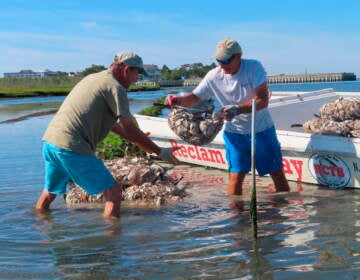Canadians returning to Cape May after 2-year COVID hiatus
A vast majority of Cape May County’s Canadian tourism business has returned. Officials hope all of it will recover next year.

Luc Belanjer (seated) with his family and friends on the beach in Wildwood, N.J. They are among the thousands from the Canadian province of Quebec who decided to spend summer vacation in Cape May County. (P. Kenneth Burns/WHYY)
The Canadians are returning to Cape May County.
Luc Belanjer and his family were among the many enjoying the beach in Wildwood in early August.
“The weather is great, the beach is good and everything’s good,” he said.
Belanjer first vacationed here 15 years ago after hearing friends in Quebec City raving about how much they enjoyed coming to the shore town. This year was his second time; the gap in visits, in part, due to life happening like the birth of a child.
But for almost two years, the land border between the United States and Canada was closed for non-essential travel due to the COVID-19 pandemic.
When the crossings reopened late last year, the Cape May County Department of Tourism was ready to invite its long-standing visitors back this summer through their “Reconnect Canada” campaign. Diane Wieland, the department’s director, said they started an advertising campaign with billboards, radio ads, and a French language Facebook page by the end of last November.
She adds that they continued to reach out during the nearly 20 months that the land crossings were closed.
“We still had a presence there,” Wieland said. “We were still keeping in front of them, ‘we’re going to be here when you are.’”
The open invitation seems to be paying off.
Max Lacouture, of Montreal, came to Wildwood with his wife, two young children and a couple of friends with their kids. He said the eight hour drive was “not too bad.” It was his third time visiting overall. He plans on coming back every summer for family vacation, noting the variety of things available like restaurants.
“The boardwalk is amazing for kids,” he said. “We can have a nice long day at the beach and then we can enjoy the evening in the amusement park.”
Belanjer was also complimentary of the attractions.
“We like the beach, we like the water park, and the boardwalk,” he said.
About 100,000 visitors from Quebec visit Cape May County annually, spending an average of $54 million. Wieland said the county is anticipating that they have recovered about 75% of their Canadian business, based on reports from hotels and campgrounds. She adds that property owners are delighted to see long-time customers return this year.
“They’re so happy to see them because over the years they’ve watched their children grown, now grandchildren,” she said. “It’s part of the family, and the Canadians felt the same way.”
Lacouture chose to bring his family to Wildwood, after hearing from a friend who traveled here as a kid and having “great memories” of those times.
“I believe when she suggested that to us…that’s probably why we decided to come,” he said. “It’s renowned for the beach and for the food and the atmosphere with the boardwalk.”
Like their American counterparts, Canadian tourists have also been affected by inflation limiting what they’re able to afford on a trip. Lacoture said they had to revisit how much they would spend on vacation, noting that they would do all inclusive trips in the past.
“Coming here on the East Coast of the U.S. in Cape May County made it a decent choice for us based on getting the most out of our money,” he said. Lacouture said they rented a condo for eight people, which allowed them to do their own cooking if they wanted.
The French-Canadian Connection
Quebecers began visiting in the 1960s looking for an affordable place to vacation. The county hired a part-time public relations representative based in Canada in 1968. In 1970, they opened a full office in downtown Montreal. Around the same time, the Quebec government instituted an annual construction holiday, a two-week break for some 200,000 workers.
The office stayed open for more than two decades until the Canadian Government instituted a goods and services tax.
“It became very, very expensive to maintain an office there,” Wieland said. “We were spending more on [rent, taxes and utilities] than we were spending on marketing.”
The county continues to maintain a PR person in the Montreal area to do outreach.
The “Reconnect Canada” campaign will expand to Ontario after seeing an increase in web traffic from that province, particularly from the Toronto area.
“They tend to be more interested in fly destinations, but they also are still concerned about the [COVID] variants and social distancing,” Wieland said of those in Ontario, adding they are now more willing to get in a vehicle and drive to a destination.
The campaign, which will run for two years, is attracting attention. Wieland said bloggers from Canada will be visiting in September and other journalists are expected to come soon.
Believing there is pent up demand, similar to Americans last year, she hopes that past Canadian tourists return to Cape May County and new tourists will come too.
“We want to make sure that those visitors know it’s an easy drive [and] it’s a safe place,” she said. “The big message for us is … ‘exciting places, open spaces,’ [and] that’s translated into French.”
WHYY is your source for fact-based, in-depth journalism and information. As a nonprofit organization, we rely on financial support from readers like you. Please give today.








